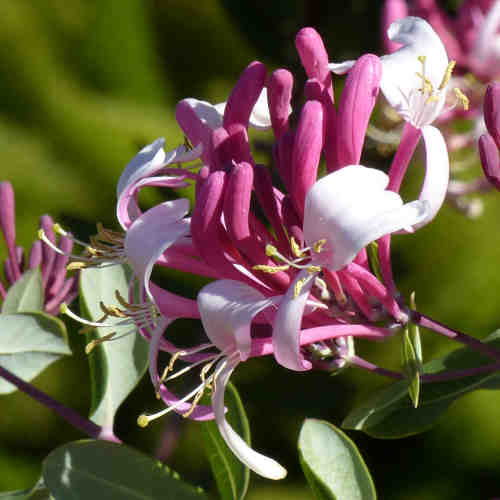Growing Lonicera americana:
American Woodbine
Description
Form: A twining vine.
Lifespan: Perennial.
Leaf retention: Deciduous.
Growth rate: Moderate to rapid.
Mature Size: 20-25' (6-7.6m) long with a 3-4' (1-1.2m) spread.
Flowers: Long red tubes with white lobes that fade to pale yellow, very fragrant.
Bloom: Spring into fall.
Fruit: Red berries.
Leaves: Dark green, oval with a pointed tip.
Stems: Twining.
Roots: Non-invasive unless fertilized.
Wildlife: The flowers attract butterflies and hummingbirds. The berries attract birds.
Toxic / Danger: All parts of this plant are slightly poisonous.
Origin: Europe.
Form: A twining vine.
Lifespan: Perennial.
Leaf retention: Deciduous.
Growth rate: Moderate to rapid.
Mature Size: 20-25' (6-7.6m) long with a 3-4' (1-1.2m) spread.
Flowers: Long red tubes with white lobes that fade to pale yellow, very fragrant.
Bloom: Spring into fall.
Fruit: Red berries.
Leaves: Dark green, oval with a pointed tip.
Stems: Twining.
Roots: Non-invasive unless fertilized.
Wildlife: The flowers attract butterflies and hummingbirds. The berries attract birds.
Toxic / Danger: All parts of this plant are slightly poisonous.
Origin: Europe.
Cultivation and Uses
USDA hardiness zones: 7-10.
Heat tolerant: Yes.
Drought tolerant: Temperature dependant.
Sun: Full sun to part shade.
Soil: Well draining, tolerant of alkalinity and salinity. Do not fertilize to avoid rampant growth.
Water after becoming established: Monthly to weekly depending on temperature. Hummingbirds may want weekly irrigation to produce abundant nectar.
Mulch: To prevent shallow roots from heat damage. The roots must always be shaded from the sun.
Planting: Lonicera americana can be grown in a large container.
Prune: Trim this vine after flowering. In mid-winter remove dead vine build-up which can be a fire hazard. Cut it nearly to the ground after two years to start over. The cultivar 'Pam's Pink' can be trained into a shrub.
Litter: Moderate.
Propagation: Seed, cuttings or layering.
Pests: Honeysuckle Aphids, if they appear, can be controlled by insecticidal soap, hosing off, or by cutting off and burning the rolled leaves where the aphids hide in the winter.
Uses: Ornamental, wildlife garden, trellised screening.
USDA hardiness zones: 7-10.
Heat tolerant: Yes.
Drought tolerant: Temperature dependant.
Sun: Full sun to part shade.
Soil: Well draining, tolerant of alkalinity and salinity. Do not fertilize to avoid rampant growth.
Water after becoming established: Monthly to weekly depending on temperature. Hummingbirds may want weekly irrigation to produce abundant nectar.
Mulch: To prevent shallow roots from heat damage. The roots must always be shaded from the sun.
Planting: Lonicera americana can be grown in a large container.
Prune: Trim this vine after flowering. In mid-winter remove dead vine build-up which can be a fire hazard. Cut it nearly to the ground after two years to start over. The cultivar 'Pam's Pink' can be trained into a shrub.
Litter: Moderate.
Propagation: Seed, cuttings or layering.
Pests: Honeysuckle Aphids, if they appear, can be controlled by insecticidal soap, hosing off, or by cutting off and burning the rolled leaves where the aphids hide in the winter.
Uses: Ornamental, wildlife garden, trellised screening.
Comments
Lonicera americana was created centuries ago, in Europe, as a hybrid of Lonicera ertusca and Lonicera caprifolium, which are European members of the Honeysuckle family (Caprifoliaceae). 'Pam's Pink' is a cultivar.
Members of the Lonicera genus are true honeysuckles. While some honeysuckles from North America and Asia are partly edible, all European honeysuckles are slightly poisonous,
Do you have additional information or a different experience for these plants that you would like to share? Email info@GardenOracle.com. All contributions are welcome and appreciated.
Lonicera americana was created centuries ago, in Europe, as a hybrid of Lonicera ertusca and Lonicera caprifolium, which are European members of the Honeysuckle family (Caprifoliaceae). 'Pam's Pink' is a cultivar.
Members of the Lonicera genus are true honeysuckles. While some honeysuckles from North America and Asia are partly edible, all European honeysuckles are slightly poisonous,
Do you have additional information or a different experience for these plants that you would like to share? Email info@GardenOracle.com. All contributions are welcome and appreciated.

Lonicera americana: cultivar 'Pam's Pink' Honeysuckle
Latest update: September, 2024
© 2008-2026 by GardenOracle.com

